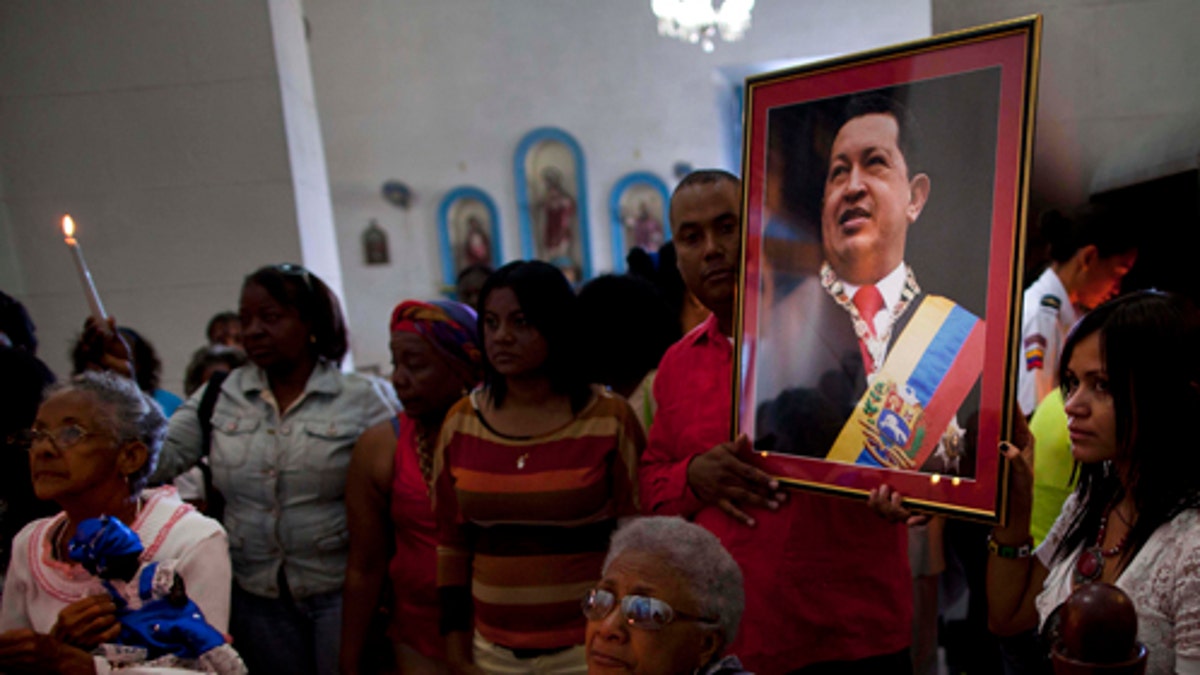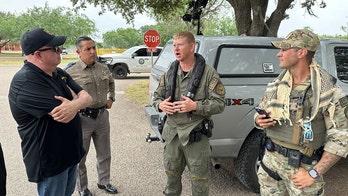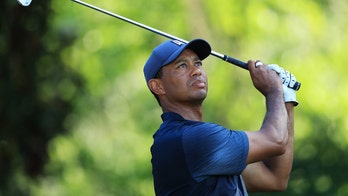
Venezuelan embassy workers hold up a framed image of Venezuela's ailing President Hugo Chavez during the monthly Catholic service devoted to the sick at the Church of Our Lady of Regla, in Regla, across the bay from Havana, Cuba, Tuesday, Jan. 8, 2013. Venezuela's government said Monday, Chavez is in a "stable situation" in a Cuban hospital receiving treatment due to a severe respiratory infection. The update came as other government officials reiterated their stance that the president need not be sworn in for a new term as scheduled this Thursday and could instead have his inauguration at a later date. (AP Photo/Ramon Espinosa) (AP2013)
Caracas, Venezuela – A key ruling from the nation's elections commission will reveal details of a vote to replace Hugo Chávez, including a possible date, amid increasingly strident rhetoric on both sides of this politically polarized country.
The constitution mandates that elections be called within 30 days of Chávez's March 5 death, though some have speculated the country will not be ready to organize it in that time frame. The National Election Commission has scheduled an announcement for later Saturday.
Chávez's boisterous, passionate state funeral Friday often felt like a political rally for his anointed successor, Nicolás Maduro, who eulogized him by pledging eternal loyalty and vowing Chávez's movement will never be defeated.
Maduro was sworn in as interim leader later Friday, delivering a strident speech that took shots at the United States, the media, international capitalism and domestic opponents he often depicted as treacherous. He claimed the allegiance of Venezuela's army, referring to them as the "armed forces of Chávez," despite the constitution barring the military from taking sides in politics.
The opposition has denounced the transition as an unconstitutional power grab, and likely standard-bearer Henrique Capriles said his side was studying its strategy for the vote, which will be held in the shadow of the government's efforts to immortalize Chávez. Since his death, the former paratrooper has been compared to Jesus Christ and early-19th century Venezuelan liberator Simon Bolivar, and the government announced that his body would be embalmed and put on eternal display.
Venezuelan television on Saturday showed a long line of people still filing by Chávez's glass-topped coffin, which has been on display since Wednesday. Many had waited through the night for a brief glimpse of their former leader.
Observers voiced mounting concern about the deep political divide gripping the country, with half of it in a near frenzy of adulation and the other feeling targeted.
"Everything that happened yesterday (with the funeral and Maduro's speech) are outward signs of a fascistic esthetic, complete with armbands," said Vicente González de la Vega, a professor of law at Caracas' Universidad Metropolitana. "It is the cult of the adored leader, an escape from reality ... They are trying to impose on the rest of the country a new, pagan religion."
He said the ruling party was playing with fire with its strong nationalistic rhetoric and the implication a vote against Maduro was somehow subversive. Capriles, too, has used emotionally charged language in his public comments. On Friday he denounced Maduro as a shameless liar who had not been elected by the people, and condescendingly referred to him as "boy."
Mariana Bacalao, a professor of public opinion at the Universidad Central de Venezuela, said the passion on both sides just hours after Chávez's funeral raised fear of far worse to come in the weeks ahead.
"You can expect during the campaign that these rages will be unleashed," she said, adding that there was a risk to Maduro if his belligerant style pushes the opposition to boycott the vote.
"Maduro needs more than ever to have an election with the participation of the opposition, because he needs legitimacy," she said.
In his acceptance speech on Friday, Maduro warned the opposition not to boycott, saying it "would be a grave error."
Opposition figures have said they are concerned about the vote's fairness, particularly given the public vows of allegiance to Chávez from senior military officials. Capriles lost to Chávez in Oct. 7 elections, but he garnered 45 percent of the vote, which was the most anyone had won against the late president.
A boycott of 2005 legislative elections was widely seen as disastrous for the opposition, letting Chávez's supporters win all 167 seats and allowing him to govern unimpeded by any legislative rivals.
In the streets Saturday, Venezuelans said they expected the opposition to take part in the poll, which will decide the president for the next six years.
"They will be present, yes, they will take part in the election," said Benito Villalba, a 62-year-old retiree who said he would vote for Maduro.
Based on reporting by the Associated Press.
Follow us on twitter.com/foxnewslatino
Like us at facebook.com/foxnewslatino




